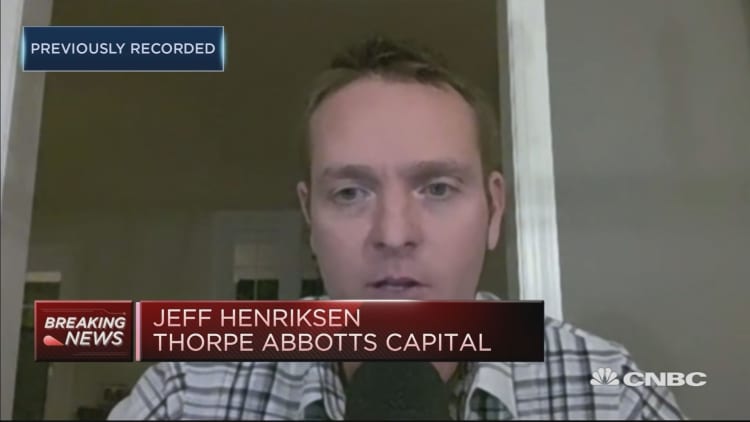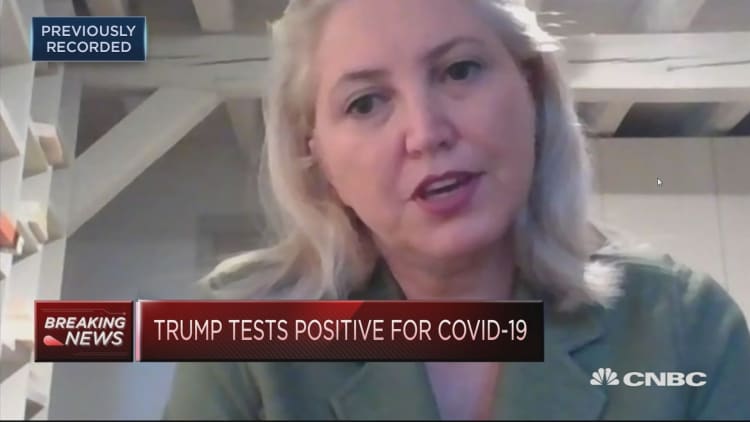
LONDON — U.S. President Donald Trump confirmed early Friday that he had tested positive for coronavirus, in an announcement that looks likely to spark volatility across global markets.
The president revealed on Twitter in the early hours that he and first lady Melania Trump had contracted Covid-19, just two hours after revealing that close aide Hope Hicks had tested positive.
Trump added: "We will begin our quarantine and recovery process immediately. We will get through this TOGETHER!"
Dow futures plunged more than 450 points on the news and were down by 355 points as of 3:10 a.m. ET, while stock markets in Asia backtracked sharply. European stocks now look set to fall at the open.
Jeff Henriksen, co-founder and CEO of Thorpe Abbotts Capital, said the news would thrust Covid-19 back into the spotlight for investors, upsetting the dueling narratives of Covid as a "slow disaster" versus the belief that the U.S. is emerging out of the crisis into a strong recovery.
"Those kind of narratives have been playing out over the last three months and you can see it in how some days you will see more growth-oriented companies — companies that are deemed to do well in any kind of world whatever happens to Covid — versus companies that need a recovery do well," Henriksen told CNBC's "Squawk Box Europe" Friday morning.
Henriksen added that the announcement would heighten existing political uncertainty around the U.S. election on November 3, another key risk event for markets, and called the president's positive test a "game changer" for market behavior in the short term.
"I think that you will see probably the tech sector continue to hold up pretty well, and I would think that some of the more cyclical names that require a recovery are probably going to not benefit," he said.
He added that Trump's diagnosis would focus investors' minds on the coronavirus pandemic once again.
"It really brings into stark reality that we are potentially going into … a second wave. President Trump getting this really highlights that in a way that I think it will focus attention back on the virus and the effects it will have," Henriksen said.
"I think that narrative is really going to be driving market behavior going forward for the near future."
Gold traded higher on news of Trump's diagnosis, while oil extended losses with Brent crude trading around 3% lower at 4 a.m. ET.
Forex markets also reacted, with the Swiss franc, yen and dollar — considered safe-haven currencies — all rising.
"There's a risk adverse reaction, so the strongest three currencies in the market are the Swiss franc, the yen and the dollar. That's just a straight knee-jerk reaction," Kit Juckes, global head of foreign exchange strategy at Societe Generale, told CNBC.
"There's a spike higher in volatility because I think a lot of people will be saying that they could imagine how this could even increase the uncertainty about the conclusion of the election."
Juckes highlighted the possibility that the American public may reconsider who to vote for in light of the diagnosis, and stressed that the upcoming vice presidential debate now looked even more important. "This certainly puts vice presidents in the spotlight."
"The bigger issue we're going to do is pay less attention to nonfarm payrolls and economic data, and more attention to medical bulletins," he added.

Main Street 'numb'
One factor potentially offsetting the downside market risk is the apparent progress in Washington toward a coronavirus relief bill, with Treasury Secretary Steven Mnuchin and House Speaker Nancy Pelosi striving to reach a deal.
Jeremy Hill, founder and managing director of JB Capital, told CNBC on Friday that the public had become "numb" to coronavirus-related news and would place more emphasis on the possible stability offered by an agreement on a fresh spending package.
"The reality is that the majority of people on Main Street are more concerned with what is going on in their daily lives and what is happening to them, and getting some degree of normalcy there," Hill told CNBC's "Squawk Box Europe."
"I think the stimulus package going through and being approved is probably going to have a more positive effect on markets, because people are less concerned with being evicted from their home or their residence, and the fact that maybe there is some degree of stabilization in their income with another $600 check coming."

